Menu
The Troubadour – 50 Years On
Today marks the 50th anniversary of Elton John’s first performance in the USA, at The Troubadour in Los Angeles. He took the stage that night as a little-known, British pop singer but when the show was over he was a sensation, embarking on one of the most successful careers in the history of music.
By John F. Higgins
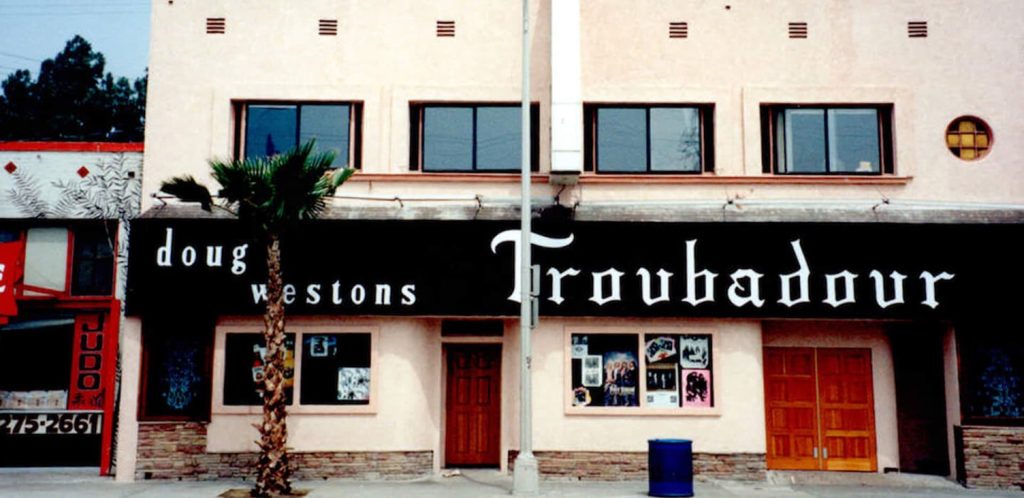
Ray Williams: “I’ll give Dick James his credit – when everybody proved to him that it was ‘happening’, he could see it. He actually did get his chequebook out. He paid what was necessary for the trip to America. He did all the right things at the right time. But he would have been a fool not to.”
David Larkham (album graphics designer/photographer): “Without Dick and Russ Regan, I have the feeling that all that followed would never have happened – certainly not in the way it did.”
Williams: “After the Elton John album was recorded, it was a lot of hustling the agents. Howard Rose at Chartwell Artists came up with a gig at the Bottom Line in New York for $50 (about what Elton was making for his shows in the UK at the time) and we said that wasn’t enough money. We needed something so Dick could put his money in for some proper dates in America. Then Jerry Heller offered $150 for the Troubadour in Los Angeles. We said that’s not enough. Eventually, we agreed upon, I think, $275…and we were off!”
August 21, 1970
The passenger manifest on the 12-hour Pan American Boeing 747 flight from London to Los Angeles included the following names: Reg Dwight, Bernie Taupin, Nigel Olsson, Dee Murray, Ray Williams, Steve Brown, Bob Stacey and David Larkham. Having met up at the offices of Dick James Music (DJM was Elton’s publisher and UK record company) and been driven to the airport, they departed London early Friday afternoon and arrived at LAX shortly after dinnertime the same day, amongst clear skies and temperatures in the upper-60s. It was the first trip to America for everyone except drummer Olsson, bassist Murray and Elton’s personal manager Williams.
It was way different [Nigel and Dee had visited in 1969 with the Spencer Davis Band] because it was a brand-new band and a brand new genre of music. Plus, there were only three of us in the band this time. However, we really felt that there were four of us with Bernie being with us on the road. We were all so very excited!
The entourage exited from economy class and was met at the ramp by representatives from Elton’s American label, UNI Records (a division of MCA): Russ Regan (Vice President and General Manager), Norman Winter (Publicist) and David Rosner (Music Manager of DJM in the United States). The only person in the reception party who had met Elton before this was Rosner, whose job had occasionally taken him to Dick James’ offices and at least one Elton club performance in London.
Also there to greet Elton and his associates was a red double-decker ‘London’ bus with a huge banner on the side reading “Elton John Has Arrived”. Until this moment, the pale boys from London were utterly unaware of what they were about to be swept up in.
Larkham: “No idea at all. Not a clue. We thought we’d get some taxis and go to the hotel. We knew David Rosner would be around to greet us. Anything after that was…quite a bonus.”
Winter, like all of his associates at UNI, had responded with fervour when he heard the self-titled Elton John album and set upon the idea of hiring the bus to drive the London contingent from the airport to the hotel. As they posed in front of the vehicle for photographs, Elton and the group began to get a sense of the level of hype that had been permeating through southern California over the previous couple of months.
Williams: “It was so exciting. I remember my wife Annelie, our three-month-old daughter Amoreena, and wives and friends came to say goodbye at Heathrow… but arriving in L.A., Elton was not so happy about the bus! However, everyone made the best of it and now when you look back all these years later it’s with a smile on our face and a fun, magical memory!”
Rick Frio (Marketing Manager for UNI): “The double-decker bus was supposed to be a joke. We got it from Universal Studios and the idea was that this group of people, theoretically, might have gotten off a double-decker bus at the airport in London as they boarded the plane to come to L.A. So, if they got off a double-decker bus at Heathrow, and they flew here and landed… the bus would be here. Like, it beat them here! That was the intention, anyway…”
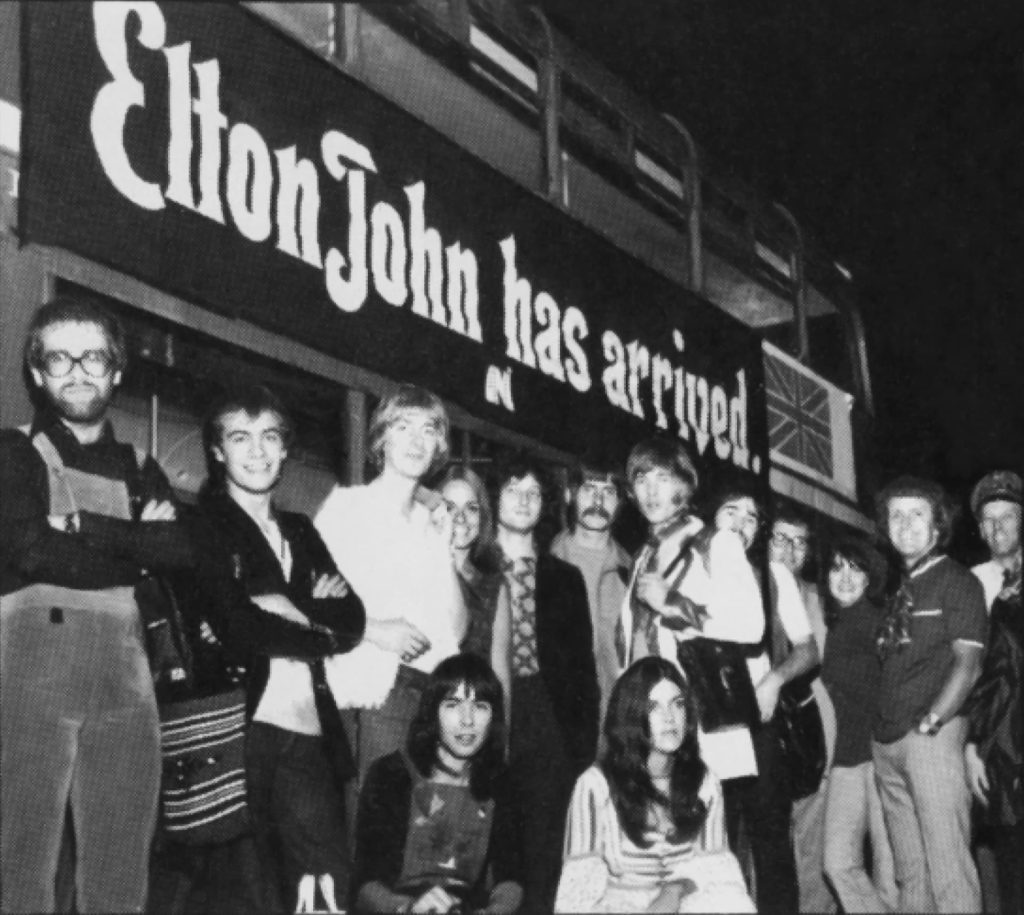
From L-R. Rear: Elton, Bernie, Dee Murray, Virginia Team - MCA Records, David Larkham, Steve Brown, Ray Williams, Bob Stacey - roadie, David Rosner, Margo Guryan, Roger Greenaway (songwriter), bus driver. Front: Nigel Olsson, Shelley - Norm Winter’s assistant at Totem Pole PR
One recipient of the publicity machine’s efforts was a brand-new staff music critic for the Los Angeles Times newspaper, Robert Hilburn, whose recent review had substantially elevated the visibility of songwriter Kris Kristofferson and established Hilburn as the go-to guy for rock record publicists.
Robert Hilburn: “I didn’t want to be snowballed into something just because other people wanted to push their artists. I kind of wanted to resist too much pressure from outside…and boy oh boy, the pressure really came with Elton. Norm Winter was really aggressive. And Russ Regan was the bulldozer behind the whole thing.”
Regan had been preparing to release Elton’s first album, Empty Sky, in America, as he had with Elton’s first US single, Lady Samantha, on the Congress label. However, upon receiving the Elton John album at his offices on Sunset Boulevard, plans quickly changed.
Russ Regan: “When I heard it for the first time, I absolutely flipped out. I looked up to the sky, and said, ‘Thank you, God’. I thought it was one of the best albums I’d ever heard. Then I called in the staff. I stopped the business – I said, ‘Put the phones on hold, and everybody come in my office’. And everybody heard it and flipped out. That was the first and only time I’d ever done that.”
Frio: “Your Song was the highlight for me but I loved the whole album – everything about it. My God, the strings… everything. None of the other record companies had anything like it.”
Elton had originally planned on travelling to Los Angeles in March of 1970. “It’ll be a promotion trip to tie with my new record company”, he wrote in a letter to his friend Danny Hutton of Three Dog Night in November 1969. But that idea did not come to fruition.
In 1970, Howard Rose was working at the New York office of Chartwell, the LA Talent Agency that represented Donovan, Andy Williams, Henry Mancini, Johnny Mathis and Glen Campbell. Jerry Perenchio, Chairman of Chartwell, was in London and heard the Elton John album at the NEMS Agency. He was so excited with it that he committed to bring Elton to America with the first booking at the Troubadour in Los Angeles. Perenchio assigned Rose to handle the day to day responsibilities for Elton John touring in the United States.
The first order of business was to make sure that Doug Weston, the owner of the Troubadour clubs in Los Angeles and San Francisco, was high on the list to receive a copy of the album. The Troubadour was targeted because of Weston’s reputation for showcasing both established and new talent. Once he had a chance to review Elton John album, with a request to place the undiscovered pianist at his club, Weston recalled, “I listened to about half the record and immediately got very, very excited. I then gave the go-ahead to book him into the Troubadour. There was no record play on him at the time, but we booked him in as a headliner nonetheless.”
The passion was shared by David Rosner, who, in a bold move, had already arranged for 3,000 British copies of the album to be shipped to the States, whereupon he and his team of eight promotion people (an unheard-of amount at the time for any artist, let alone an unknown) set upon the task of delivering it to radio stations around the country, three months before the album was even available in American stores.
David Rosner: “We took a chance that the airplay, with no product to buy, wouldn’t hurt… it would help. And that became the case. Between the time of the album’s American release (on July 22nd) and the Troubadour shows, we did show up on one chart. The original deal between Dick James and UNI was that Elton had to be on all three US album charts [Record World, Cash Box and Billboard] before Dick would send Elton over to perform. But UNI and Dick came on board after the album appeared on just the Record World chart.”
Williams: “Dick thankfully came up with budget and Russ Reagan and Rick Frio did a magnificent job on behalf of UNI.”
Frio: “The four of us – Russ, Pat Pipolo [Director of Promotion for UNI], Norman, and myself – did what we basically did every day. We worked the same stores, radio stations, publicists, interviewers… everything was done the same way for each and every act. I’m not saying we were the only ones; everybody – Perenchio, Rosner, Weston – had a piece of breaking Elton in America.”
So, the double-decker bus journeyed the 17 miles northward via La Cienega Boulevard from the airport up to Sunset Boulevard and the hotel, with Norm Winter “working the room”, Elton cracking everyone up with his brilliant impersonations of characters from the Goon Show, and Bernie and David Larkham, “gawping out of the windows at the very real hamburger stands, gas stations, donut places, neon lights, taco joints, cars – all the visual ephemera that we’d wanted to check out in person since we were teenagers”. Surely the entourage also passed by the homes of people who were already familiar with the Elton John album, but it can safely be said that no one, on the bus or off of it, had any idea what was about to happen in three days’ time.
Nigel Olsson: “The double-decker bus ride was very cool. Having the bigwigs from the record company, the agent, and the publishing company people all so attentive and kind to us. It was really great.”
Larkham: “On the bus ride in, Russ Regan kept saying, ‘We love you guys…we LOVE you guys!'”
Regan: “I had a saying at that time: ‘I love you guys!’ And I meant it!”
After checking in to the Continental Hyatt House and unpacking, Elton, Steve Brown (Elton’s creative manager in the UK), and some of the others were taken to the Troubadour by David Rosner and his wife, singer Margo Guryan. On the bill that night were The Dillards, a bluegrass band, with Longbranch Pennywhistle (featuring future Eagles, Glenn Frey and JD Souther) as the opening act. Elton was very excited to see The Dillards and also to check out in person the club that he had just travelled 5,456 air miles to play.
“
August 22-24, 1970
On Saturday, the day after landing, Elton and the group began to shake off the jet lag by walking around the Sunset Strip area. Some wandered to the Troubadour to have another look; some went to the Tower Records store (less than a mile to the west on Sunset), which, for Elton and Bernie, had been as much of a motivating factor in making the trip as anything else. Some began shopping for the “hip” clothing that had swept across Southern California (and the rest of the youth culture): tie-dye jeans and t-shirts.
On Sunday, a spontaneous plan was devised by local friends of Ray Williams, Janice Malouf and Maxine Feibelman, to drive to Palm Springs, a resort 110 miles southeast of Los Angeles. The adventurers included Bernie, Maxine, Nigel, and Dee in one car, with Janice, Ray, and David Larkham in the other. Steve Brown baulked at the idea of squeezing into the back seat of Janice’s Karmann Ghia with David and chose instead to work on some details with David Rosner. Elton, by now getting very impatient with the three-day wait between arriving in L.A. and the first performance, did not want to go on the excursion, so the group went on without him. Upon returning to L.A. in the late afternoon, the group soon realized that this had not been a good idea. While they had been enjoying themselves in the desert sun, Elton was sitting in his hotel room getting more and more upset at their decision to leave, eventually making anxious phone calls to Dick James in London saying he was going to return that very day and the shows would not happen. Dick was able to keep Elton from following through on this threat until Ray Williams returned to the hotel. Elton had furious words with Ray about being “deserted,” and it took some defending and apologizing from Ray before Elton agreed to stay put and go on with the shows. Once this happened, everything was back to full steam ahead towards Tuesday.
Williams: “Elton originally was going to go with us, however suddenly he didn’t want to go. So, fair enough, everyone said OK, and as friends, we didn’t think it was an issue so off we went and had a great time. But when we got back, we found a very agitated, nervous Elton. In a nutshell, it got very heated and we had a big row through the hotel. In retrospect, probably going to Palm Springs was not the best thing to have done. I had been to the States a few times before and the tension for Elton on his first trip and first US gig must have been massive. We did make up later that day… by Elton pushing me into the Hyatt pool!”
Larkham: “Steve staying behind meant that he was at the hotel to begin the appeasement process with the upset Elton. On our return from Palm Springs, Ray completed the ‘calming process’ and then we all trooped up from the hotel corridor to the roof pool. Sure enough, once Elton had pushed Ray in, then he was fine. The tantrum was over.”
On the 24th, UNI/MCA arranged for limousines and a carte blanche trip to Disneyland for Elton and others in the group. Here they were treated as VIPs, escorted past the lines of people waiting to go on the rides and being taken to lunch at the Blue Bayou restaurant.
Olsson: “The funniest thing I can remember is, Elton had gone to Disneyland, and then came into the dressing room before the first show at the Troubadour wearing these huge Mickey Mouse ears with his large glasses and telling us that this was what he was going to wear onstage that night. We didn’t think he was serious about that, but oh yes, he was! And it went down a storm. Dee and I could hardly play at one point, we were laughing so hard.”
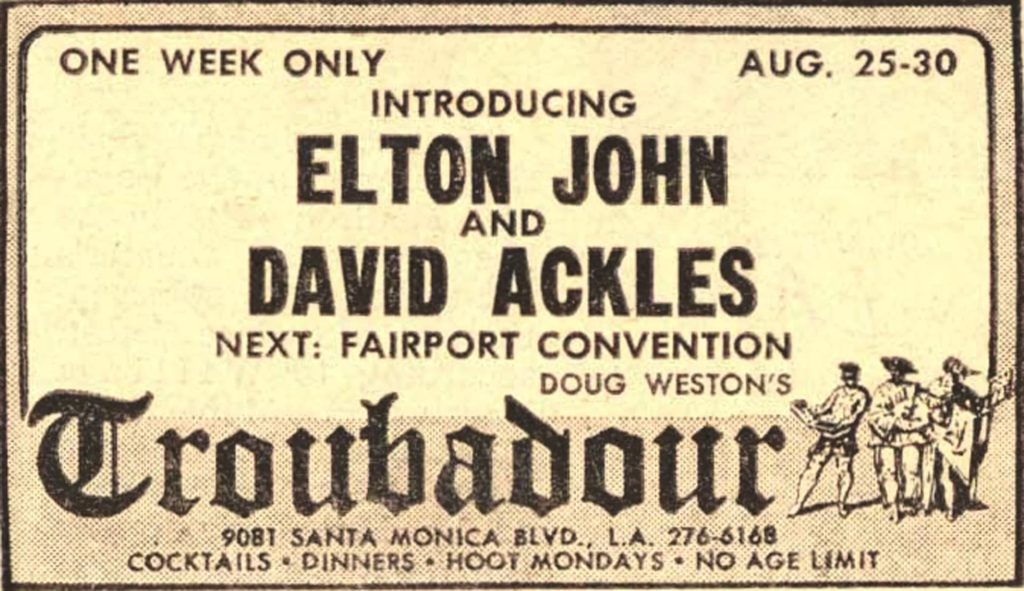
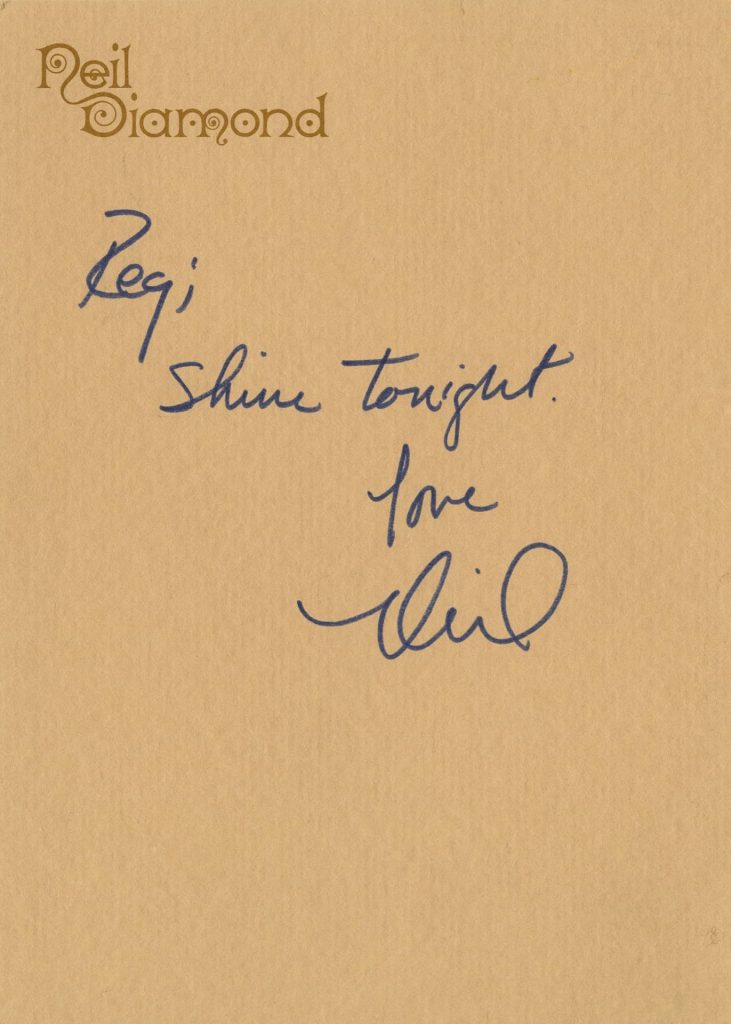
Also during the hiatus before Tuesday, David Rosner finalized a surprise he had been working on for the opening show.
Rosner: “Neil Diamond and I had been friends for years, since before he became famous. And he was among the people that I had sent the ‘Elton John’ album to. So, I asked Neil if he would introduce Elton at the Troubadour (on the first night), and Neil said that he would love to, but, ‘You’ve gotta ask Elton if he wants to be introduced by me.’ When I told this to Elton he just lit up. He said, ‘That’s amazing. The last album I bought before travelling was Neil’s Tap Root Manuscript!'”
“A day or two before the show, I brought Elton and others in the group to Neil’s house for a casual introduction. Elton wasn’t himself at this. He was very soft-spoken. I had gotten the best view of Elton’s personality on that bus ride from the airport, where he was doing bits from the Goon Show and different characters and everything. But he was not that way at Neil’s house.”
In the days leading up to Elton’s American debut, L.A. Times critic Robert Hilburn continued to be intrigued by the artistry of what he was listening to on his turntable.
Hilburn: “I had been sent two albums – the Elton John album, which had already been released here, and Tumbleweed Connection, which hadn’t been released anywhere yet. When I sat down and started listening to those records, the first thing that struck me was that, in a time when most people who were entering pop music were kind of aggressive and ‘rock and roll’ and still sort of part of that 1960s world, Elton just didn’t seem like that. It didn’t seem like he was trying to just mimic something that was already successful.”
“I really liked Bernie’s writing; he would have a way to put in things that most people didn’t put in songs. Like the kind of hesitant, uncertain lyrics in Your Song (”anyway, the thing is, what I really mean”). I thought that was cool because that was not like other stuff. A lot of songwriters pretend like they know the answers and everything… and I thought that was a great way to say the uncertainty of your feelings about people.”
“But I think it was Tumbleweed that impressed me the most. Because I loved The Band, and that second record was a lot like The Band. It was this kind of timeless, Americana, thing to me. Which was strange ‘cos they were from England.”
“I didn’t know how they wrote songs in those days; I just thought they sat down wrote them together in the same room. I was amazed how everything sounded perfect. It sounded like these songs were meant to be with these lyrics. It was a complete package. It was just an amazing work of originality and imagination…and not being limited by what they think is going to be commercial. They had something new to say.”
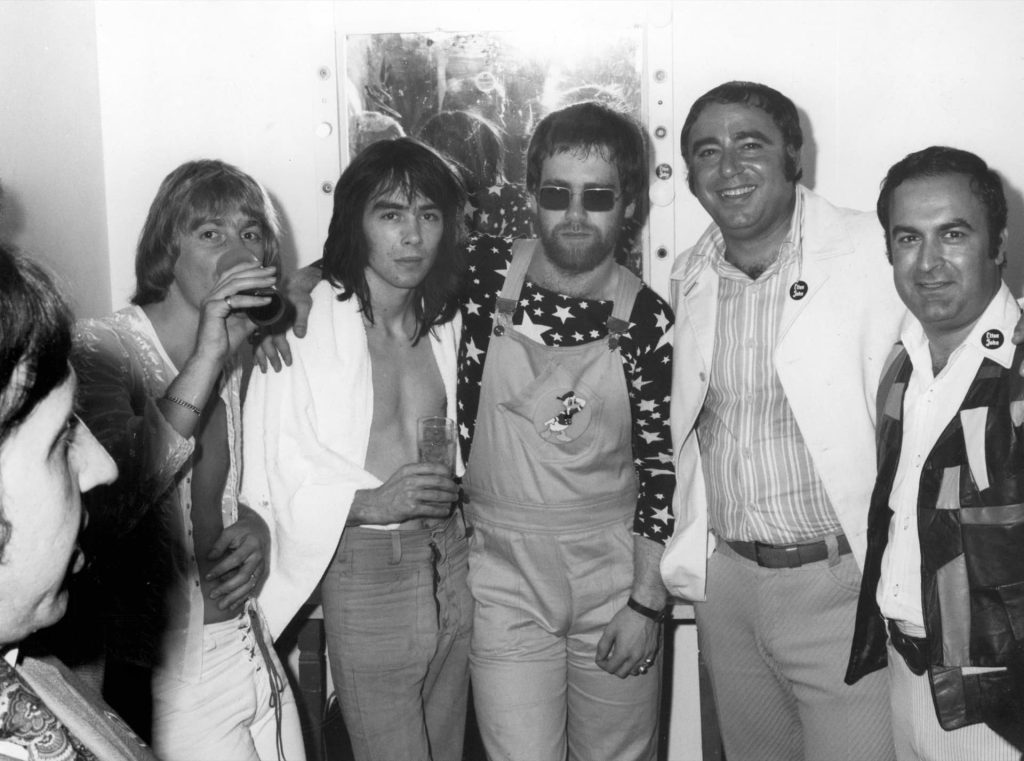
Backstage at the Troubadour following Elton's debut on August 25, 1970. Pictured L-R: Norm Winter (publicist), Dee Murray, Nigel Olsson, Elton, Russ Regan (UNI Records President), Rick Frio (UNI Marketing Manager) (Photo Courtesy of Rick Frio)
August 25, 1970
Around midday, tour roadie Bob Stacey brought Nigel Olsson’s drum set out from storage and set it up on the Troubadour stage… and for the first time since they had left England, the Elton John band actually played music together. They had not had the opportunity, or venue, to rehearse until sound-check. With Elton using the house piano, which his idol Laura Nyro had played just two weeks before, he, Dee and Nigel ran through some of the songs that would be featured in the show later that evening.
Rosner: “Elton was pissed that he had three days before the show. He was bugged. He was antsy. He just wanted to do it. His attitude, very clearly, was ‘We are going to do a great show’. He told me he can’t predict how people are going to react, but he and the band were gonna do fine. He was confident as hell.”
Larkham: “Before we came to America, and even after we were there for a little bit, Elton’s thinking might well have been, ‘Yes, this is a gig and maybe nothing will come of it’. However, because of all the fuss that the MCA/UNI brass were making, it probably placed an onus on Elton to a degree. And he would have felt, ‘I owe these guys a good one.'”
Regan: “I couldn’t make the soundcheck, so I sent Rick Frio over. And he said, ‘Russ, you’re not gonna believe it. It’s a three-piece band…and they sound like a full orchestra! It was incredible.’ I mean, Nigel was on a drum kit that was extraordinary. Dee Murray was a great bass player. And Elton, of course, was a classically trained pianist. It was just amazing that they could generate that kind of music with only three pieces.”
Frio: “I remember it like it was yesterday. It was mid-afternoon when I walked in and as my eyes adjusted from the daylight to the dark room, I could see the band was doing their soundcheck. And when I heard it, in my mind I said, ‘This is crazy. They are not going to get away with this’. Because I thought they were playing a track behind it to augment the sound! The music was so BIG. (This is more common now, but it would happen on American Bandstand or something – the act would lip-sync.) With the three guys on stage, it really sounded like the album. I went, ‘My God, they can’t be playing this by themselves… there’s only three of them up there! They are going to be laughed off the stage. If they are playing a track behind them, we’re gonna see that very clearly. Because we’re in Hollywood. You don’t do that kind of stuff here.’ Then I came to my senses. ‘No, it’s just the three guys!’ That’s when I used the office phone and called Russ. I said, ‘Russ…you are not going to believe this. It’s incredible!'”
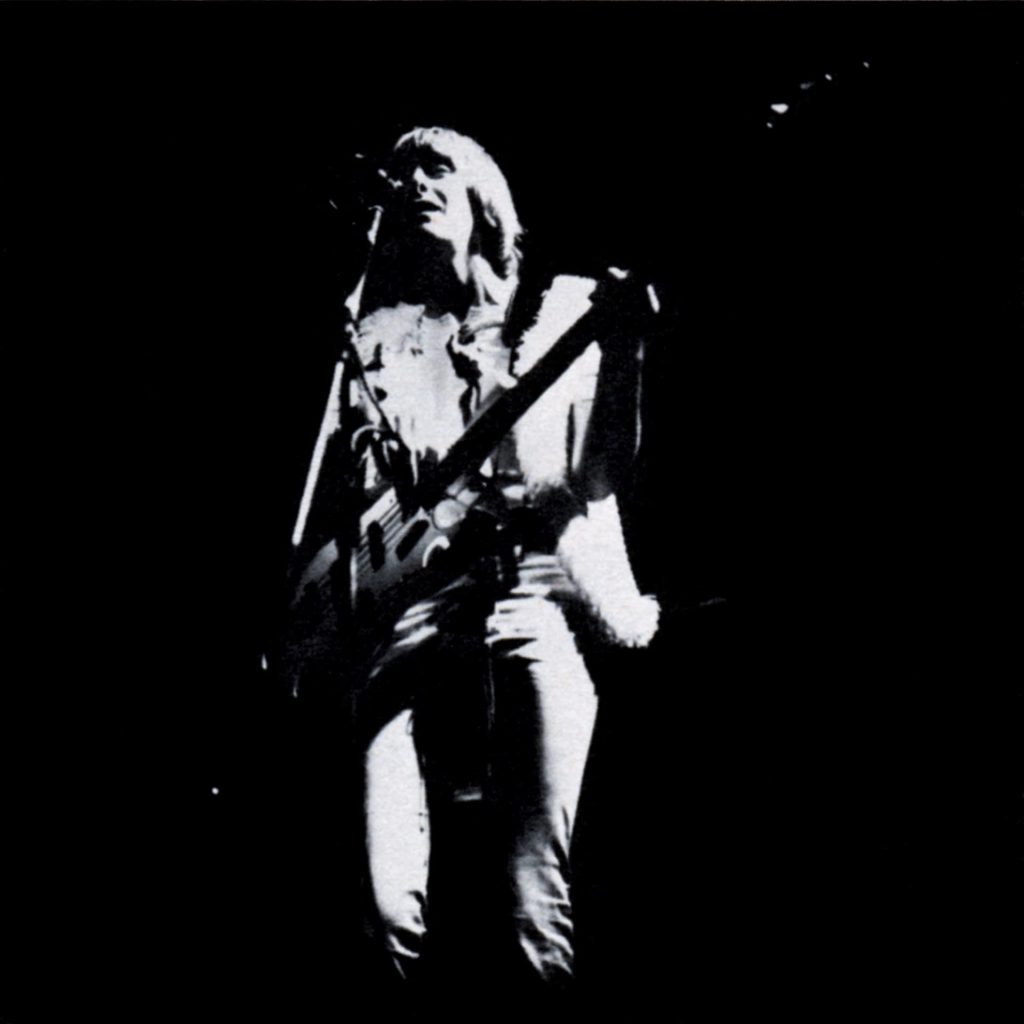
Dee Murray (left) and Elton perform at the Troubadour. (Photos by David Larkham)
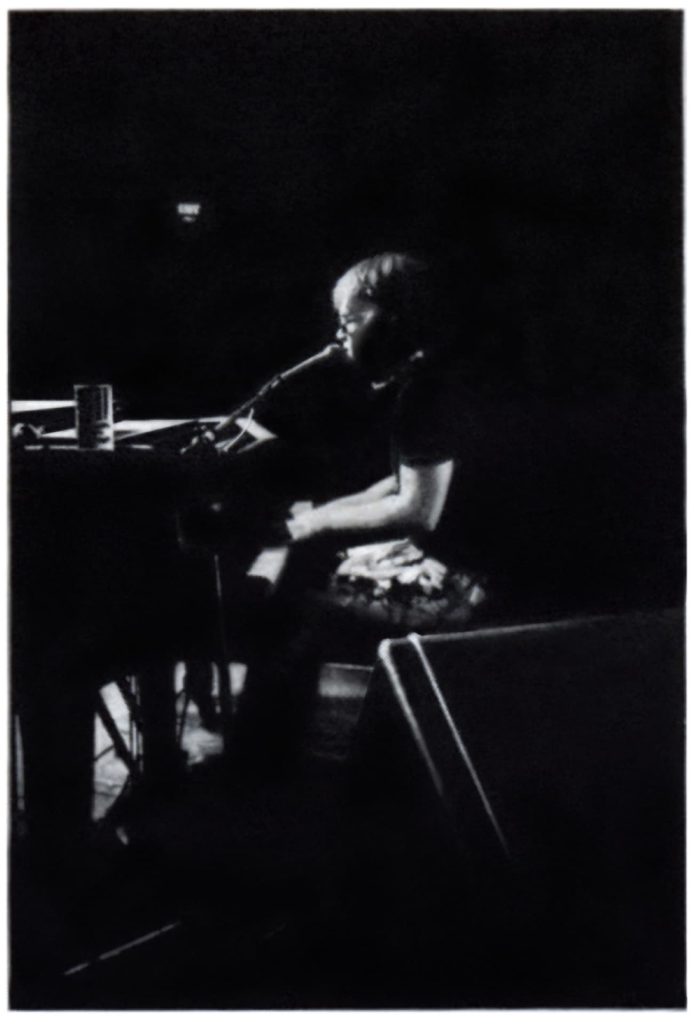
Elton John’s American debut on August 25, 1970, may have cost $5 to get in, but very few people in the audience that evening had been asked to pay the cover charge. Winter, Rosner, Regan, Frio, and Pipolo had spent the better part of the previous two months assuring that the 300-seat club would be filled with celebrities and notables from the L.A. music and media communities. Some were there to see this new piano player they had been listening to on their radios and turntables, some were there at the behest of the UNI team, and some were there simply because the Troubadour was the place to be if you wanted to hear good music in L.A. and be a part of the scene.
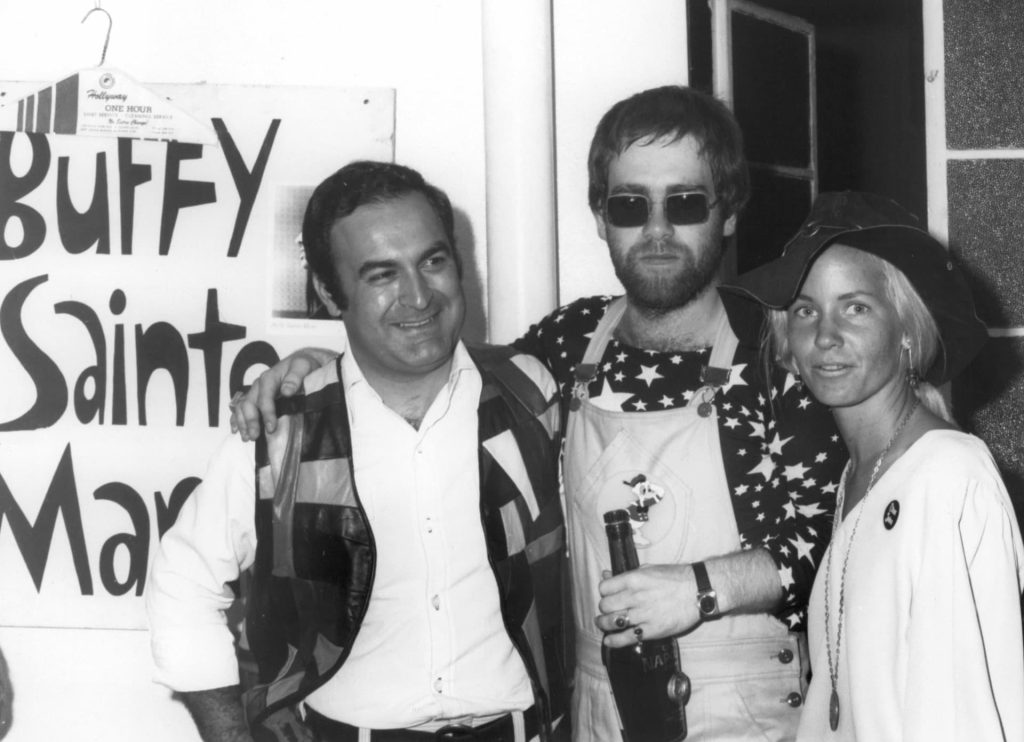
Elton backstage with UNI Marketing Manager Rick Frio and reporter, Marilyn McGinnis. (Photo courtesy of Rick Frio)
Before the show began, as per David Rosner’s arrangement, Neil Diamond, holder of the Troubadour house record for attendance at the time, got up on stage to thunderous applause and gave his introduction.
Williams: “I think we were all very nervous by now. I remember thinking, ‘This is it’ and on walked Neil Diamond! Well done, David Rosner, for organizing that.”
Hilburn: “So, I go to the show, and still it felt like there was this pushing and pushing [from the publicity people]. Like, ‘This guy’s gonna be big, this guy’s gonna be important!’ I said, ‘These records are really really good, but I don’t know if I can believe all this hype.’ So I thought, ‘Let’s try and forget all this stuff and watch the show.’ And Elton just kind of comes out on stage – and he’s not really charismatic, in the sense of Mick Jagger or Elvis Presley. And Dee on bass was so laid back. I was like, ‘I don’t know… it doesn’t seem like this is quite ready for The Troubadour yet. Maybe they will just be great songwriters.’ And also, ‘Where is Bernie? I don’t even see Bernie. How come he’s not on the stage?’ Because in most bands you have both songwriters up there, you know?”
Rosner: “Elton came out with Dee and Nigel, but the band did not play a note at first. Elton started the concert with Your Song, solo at the piano. Then in the tag, Dee began playing. No Nigel at this point. And that was Your Song. And that was nice. And applause. And then, it gives me the chills every time I think about it, the next song was Bad Side Of The Moon. Nigel starts off with a kick-ass drum intro… and they all start singing ‘ousemalah, ousemalah…’ Oh my God! The place was fit to be tied. It was just amazing!”
Folks, I’ve never done this before, so please be kind to me. I’m like the rest of you; I’m here because of having listened to Elton John’s album. So I’m going to take my seat with you now and enjoy the show.
The set list for Elton John’s first performance in America included: Your Song, Bad Side Of The Moon, Sixty Years On, I Need You To Turn To, Border Song, Country Comfort, Take Me To the Pilot, Honky Tonk Woman and Burn Down the Mission (which featured a medley of My Baby Left Me and Get Back as the song slammed past the ten-minute mark). Of these songs, just five were on the only Elton John album actually available for sale at the time. One song was a Rolling Stones cover, one was the B-side to his Border Song single…and two were from a record that would not reach American ears for another five months. Commenting on the large percentage of unfamiliar material in the set, David Rosner said, “If the songs weren’t really good, the show wouldn’t have worked.”
Hilburn: “Burn Down The Mission is when he knocked down the piano bench and it was like Jerry Lee Lewis! That song really gave him an energy. And I was going, ‘This show could be fun! Boy, this guy’s got a lot going for him.'”
Frio: “That first night, I sat at the first table, right off of Elton’s right leg. So, when he kicked over that piano bench, it shocked the hell out of me.”
Neil Diamond: “Elton had stopped by my little house off Coldwater Canyon in L.A. a day or so before the show, and he sat in my living room holding his cap in his lap. He was super quiet and shy. I thought to myself, ‘This kid’s never gonna make it.’ After introducing him from the stage that night, I joined our label president (we shared the same tiny record company, UNI Records), Russ Regan in the audience. When Elton kicked back the piano bench and started playing and singing à la Jerry Lee Lewis, I knew I was wrong. I started cheering so loudly, I spilled my drink. Elton’s been one of my favourites ever since.”
Leon Russell: “We’d been trying to get Elton for Shelter Records [the US record company started by Russell in 1969], but we were about a week late. I knew about him before he came to America; I had heard him with Long John Baldry. I sat down in the first row at the Troubadour, and he was brilliant. I wish we could have got him for Shelter.”
Hilburn: “These guys were taking me somewhere else…I was seeing something I hadn’t seen come along in a while. This was very exciting – this was very different. He had so much going for him: he could be a winning act in person, it could be something you could sit down within a crowd and listen to, and you could sit down in your room and listen to it on your own. It seemed to me that if you had a checklist of what things you thought were good in music, and a checklist of what things were commercial…they connected on both scales. And that was rare.”
Rosner: “The audience was expecting James Taylor…and they got a cross between Jerry Lee Lewis and Leonard Cohen. Someone with great depth and also great entertainment flair. They were certainly not expecting what they ultimately experienced, myself included.”
Olsson: “I will always remember the first show…especially because of the way the audience reacted to a band of three sounding almost like the recordings on the Elton John album.”
Larkham: “Elton’s style of performance had been on display a bit at the shows I saw in London, but the reaction we got from the audience in Los Angeles was much more glowing. He got some very good responses in England, and some good press, but the Troubadour was where it all began, really.”
Hilburn: “In those days it was like, ‘How do I write a review? I don’t know how to!’ I was just barely starting out. So, I just pretended. Like, “I’ll just write to a reader. I’ll just pretend I sat down and called a friend.” That’s why the first word in the review is “Rejoice”. I was saying “Wow! This is gonna be something to watch. This is good for pop music. And I think he’s going to be so big that everybody’s gonna be after him: fans and concert bookers and everything else”. There was just no limit to this, it seemed to me.”
Weston: “In the whole eighteen years of Troubadour history, no artist had ever captured the town as completely and thoroughly. It was unique for a total unknown to’ve gotten such a wildly positive response. The Elton John situation was nothing short of phenomenal.”
Regan: “It was magical, that night. August 25, 1970 is considered one of the ten greatest nights in Rock and Roll history.”
I didn’t come down for two days I was so high from the excitement of that night. I think there were maybe 300 people in that room Tuesday night, but everybody I talk to [now] says, 'Yeah, I was there!' So, there must have been 30,000 at The Troubadour that night.
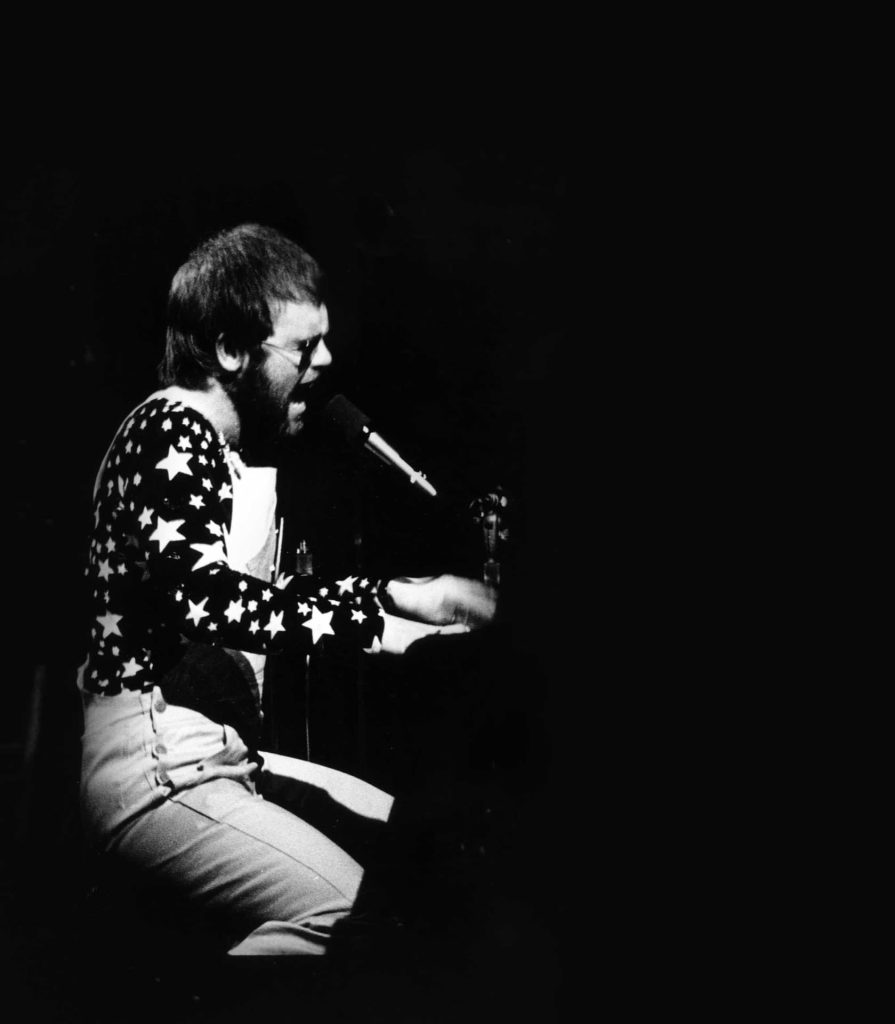
Following the Tuesday night debut, Elton played one show each evening on Wednesday and Thursday, then two shows (at 8 and 10 p.m.) on Friday and Saturday, and finally one on Sunday night to wrap up the stand.
Rosner: “There was an increase in the size of the audience over the run. Of course, opening night it was full. Norman Winter and I and the others involved, invited…well, everybody. Then on the second night the audience numbers dipped, but by the end of the week there were lines around the block.”
The reason for the attendance resurgence, and then some, was that by then word had gotten out about this new British pianist and singer who was holding court at Doug Weston’s hotspot. In 1970, it couldn’t help but take a few days for a buzz to spread – even in a local area. But once the newspapers had been delivered to doorsteps and newsstands across the city, it became clear that the reviews of his Tuesday night show had been written by ecstatic scribes. None more so than Robert Hilburn, whose assessment appeared on page 22 of the L.A. Times two days after the debut, on the morning of August 27th.
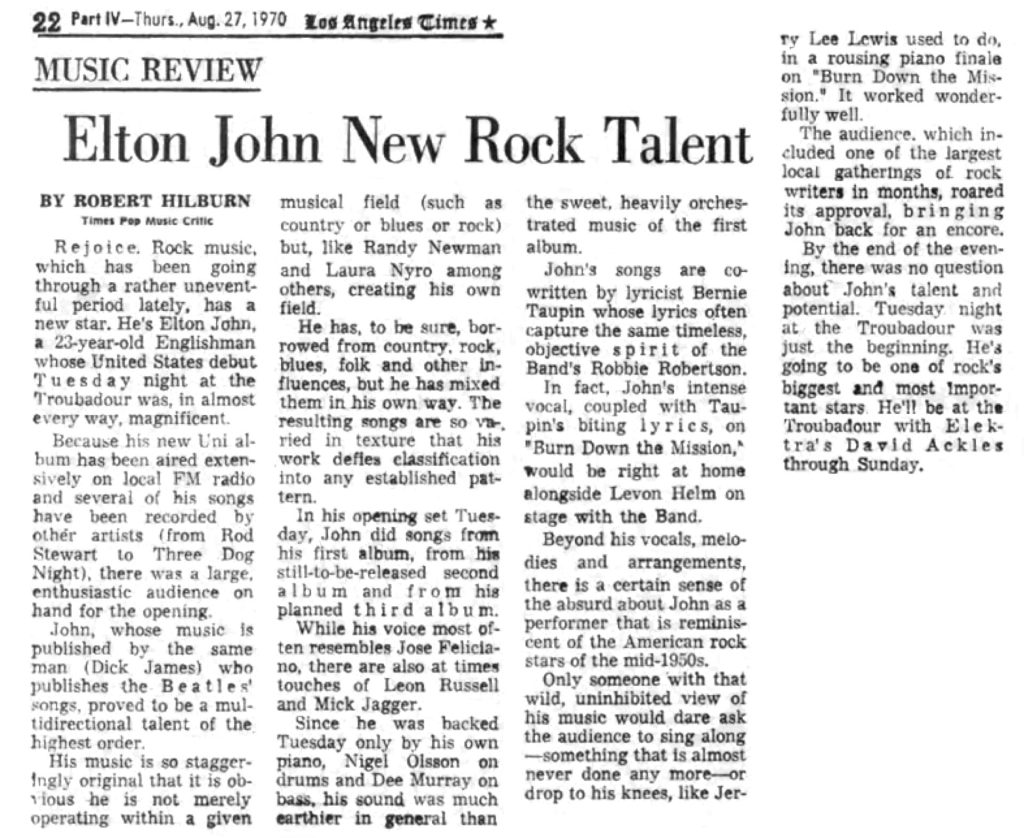
This review, like no other alongside it, would generate a great deal of interest in Southern California – amongst the readership of the L.A. Times (which was nearly 900,000 strong at the time)…the not-easily-impressed movers and shakers of the local music industry…everyone inside Elton’s entourage…and the public at large. While the singer certainly had the talent to ascend the music business at some point, Hilburn’s ink-wash of praise unarguably lit the match to the fuse on Elton’s career.
Olsson: “We all had a great reaction to Hilburn’s review, and I think still to this day it was one of the best reviews we have ever had. (In fact, my son Justin now works on Robert Hilburn’s cars…in his garage by the motorway!)”
Hilburn: “I came back two or three times during the week and saw Elton and met him. I liked him so much I went to San Francisco (the following week) and did a big Sunday story for the paper. I was impressed by his love of music and how much he knew about it. He wasn’t talking about himself a lot, he just wanted to talk about music – that’s what was important to him.”
Larkham: “We knew that radio stations had already started playing Elton’s music, but I remember we were going somewhere in a car later on that week…and to have an Elton song suddenly come on the radio? Everyone jumped. Electric shock. Smiles on everyone’s faces as you looked around at each other.”
One afternoon during the week of August 25th, Elton, Bernie and some of the others in the entourage went to visit Leon Russell, who had been so taken by Elton’s show at the Troubadour that he invited the songwriters over to his house in L.A. The two pianists soon found themselves at the pair of pianos Russell had in his home, where he and Elton unsuspectingly set the table for their 2010 collaboration, The Union, four decades before the album was recorded.
Leon Russell: “Sometime after the first Troubadour show, Elton and Bernie came over to my house. They were both very shy and very English, and Elton told me I looked like a proper rock star. They liked a sign I had above the piano saying, ‘Don’t Shoot The Piano Player’. I think maybe that was where they got the idea for that album title.”
Rosner: “It was a thrill seeing them play at two pianos. It was terrific. They were having a grand old time. And it was during that time that Elton was having throat problems. Following this visit, my wife, Margo, walked from our hotel to The Source (a vegetarian bistro on Sunset Boulevard) and picked up the ingredients for a remedy.”
Larkham: “Elton was beginning to complain about his voice problems, from the drier Los Angeles air, and Leon was able to advise him on a sort of warm lemon and honey drink, to help his throat during the Troubadour week.”
By the time the week was over, Elton had performed in front of much of the Hollywood music elite…and even some future collaborators.
Attendees included Leon Russell, T Bone Burnett, Linda Ronstadt, future Eagles Glenn Frey and Don Henley, Randy Newman, Mike Nesmith, Janis Joplin (according to some reports), Danny Hutton – who, as a member of Three Dog Night, had already recorded two John/Taupin compositions, Lady Samantha and Your Song, in the past fourteen months – Dave Mason, Quincy Jones and his wife, actress Peggy Lipton, Gordon Lightfoot, Peter Asher, and members of the Beach Boys, Bread, and Crosby, Stills and Nash. One audience member, blues singer Odetta, was invited up on stage during the second night to join Elton on Take Me To The Pilot, which she was about to release on her own album, Odetta Sings.
Howard Rose wasn’t able to attend and witness Elton’s headline performance that August in 1970 at the Troubadour, but Jerry Perenchio did, and he phoned Rose saying how fantastic Elton had been and raving about the incredible review in the L.A. Times.
Rose: “The Elton John American explosion happened as a result of Elton’s outstanding, jaw-dropping performance at the Troubadour, followed with an incredible performance review from L.A. Times music writer Bob Hilburn. Three months later, Elton returned to the Los Angeles area, opening for Leon Russell, and after that, it was massive hit after massive hit every year, and success skyrocketing bigger and bigger.” (Howard continues to represent Elton John through his own Talent Agency today.)
I couldn’t really make up my mind back then whether I was Reg or I was Elton… but I know who I am now.
Following additional shows in San Francisco, New York, and Philadelphia, the group’s return jet took off from John F. Kennedy International Airport for London on September 13. Onboard were eight people changed by the experience of the last two weeks. Some would eventually settle in Southern California, some would work for Elton long enough to experience every fantastic stage of his career first-hand, and some would continue their careers elsewhere in the industry. Sadly, Dee Murray would be taken too soon, in 1992, at the age of 45.
Williams: “Early in 1992, Elton was recording The One album at Guilliame Tell studios Paris. He invited me to the studio to hear the tracks and have dinner later. As soon as I arrived at the studio Elton broke the news to me that Dee was very ill and hadn’t long to live, I was devastated and all I could think of was the ‘magic’ created by Elton, Nigel and Dee at the Troubadour.”
And at the axis of this group: a 23-year-old pianist and songwriter still named Reg Dwight. Who, to his great surprise, had discovered the road to stardom somehow began at 9081 Santa Monica Boulevard. The transition to truly becoming Elton John had begun.
Larkham: “My ex-wife, Chrissie, worked for the head of press at DJM Records. Elton, on this tour and the next few tours, would send post-cards to DJM Records, and Chrissie kept them all. And some of them he signed ‘Elton’ and some of them he signed ‘Reg’. We had them framed and given to Elton on his 50th birthday, and afterwards we got a really nice thank you card from him. It said, ‘I couldn’t really make up my mind back then whether I was Reg or I was Elton…but I know who I am now.'”
Britain may not yet have embraced their own national treasure, but in America the mechanisms had already been set in place to bring Elton John further into the public consciousness. However, the fever that had gripped West Hollywood and its surroundings for the past week had not yet reached or taken hold elsewhere in the country. There remained much to be done. This included continued legwork by the UNI team and David Rosner, as well as plans to bring Elton back to the States in just seven weeks for a 12-city tour – which would include the set at A&R Studios in New York that was released as the live album, 17-11-70.
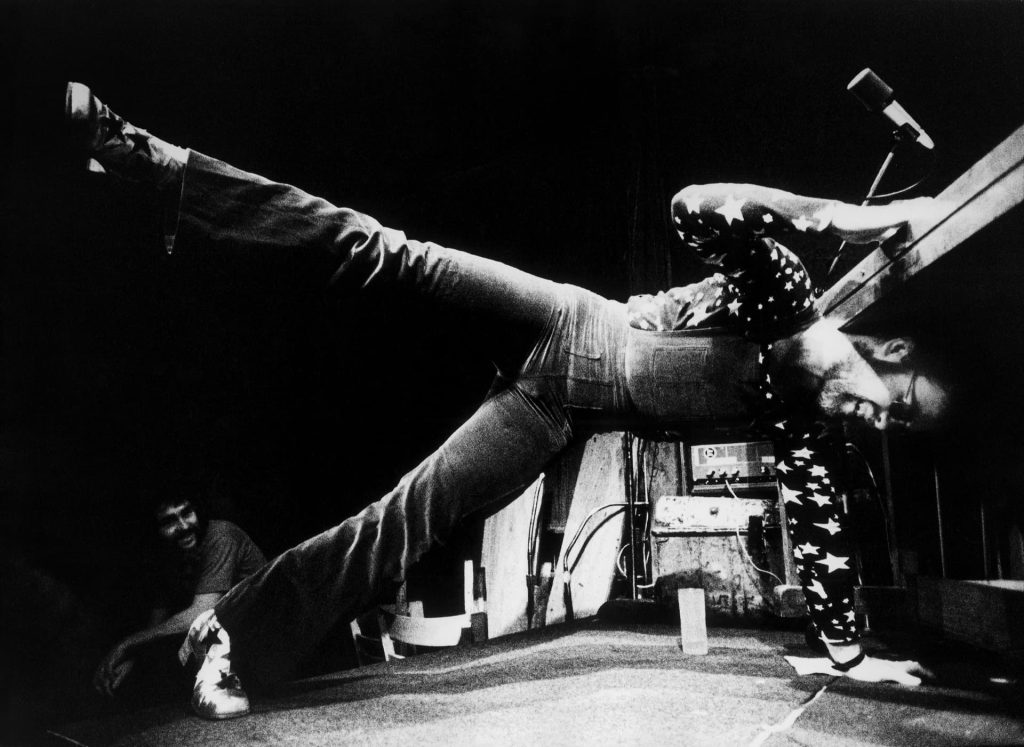
Elton performs at the Troubadour on opening night. (Photo: Ed Caraeff / Getty Images)
Before there was Daniel or Davey Johnstone; before there was Live Aid or the AIDS Foundation; before there was Billy Bones or Billy Elliot, there was the Troubadour.
And for the fifty years since, there has been only one thing to do…
Rejoice.
EltonJohn.com would like to thank Neil Diamond, Robert Hilburn, David Larkham, Nigel Olsson, Russ Regan, Howard Rose, David Rosner, Leon Russell (all interviewed in August, 2010), and Ray Williams and Rick Frio (August 2020) for their time and reflections. Doug Weston quotes originally appeared in Record World’s Elton John Spectacular (1976). Special thanks to Dale A. Berryhill, Pete Dobbins, and Keith Hayward for additional research.
